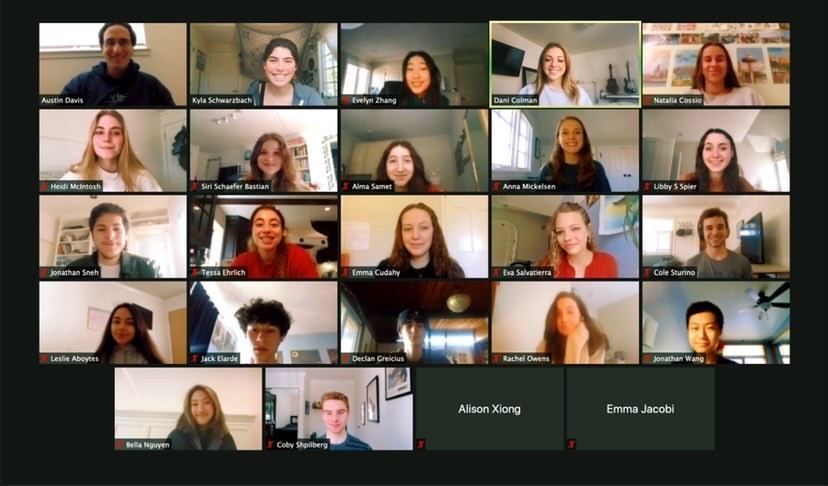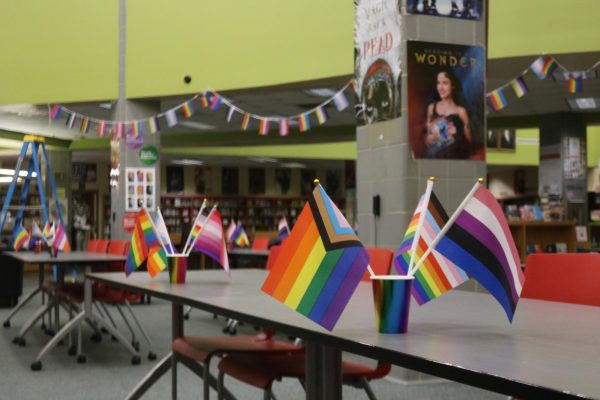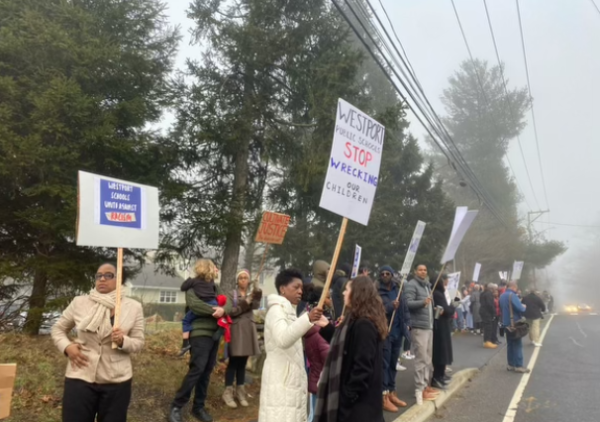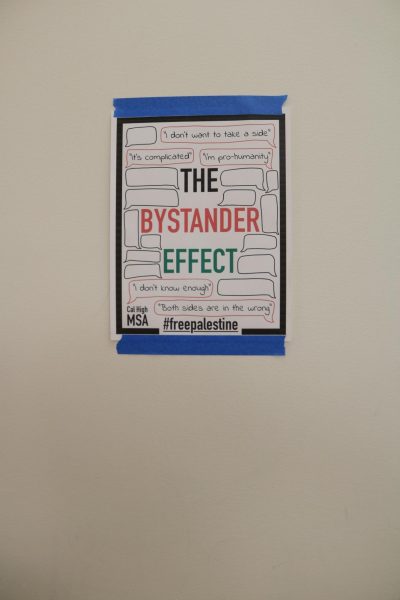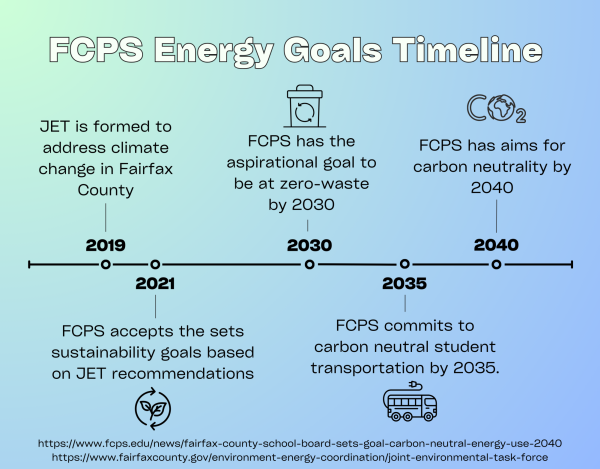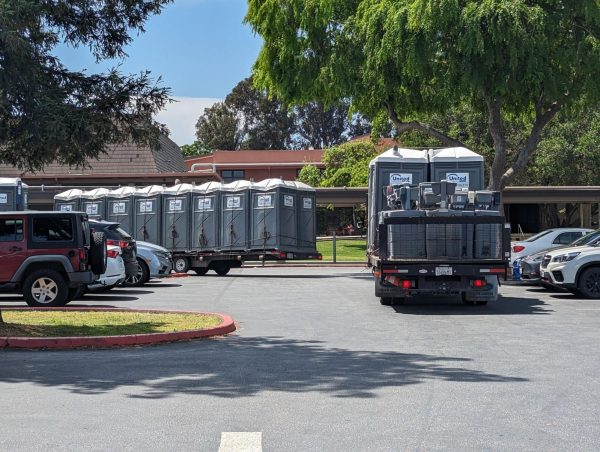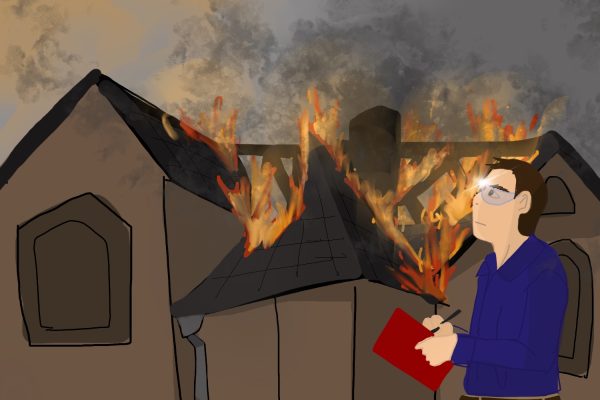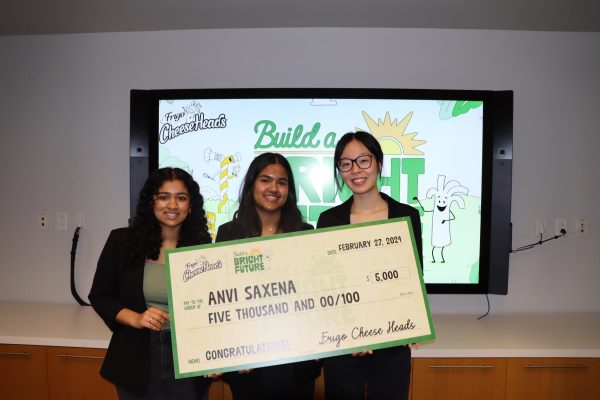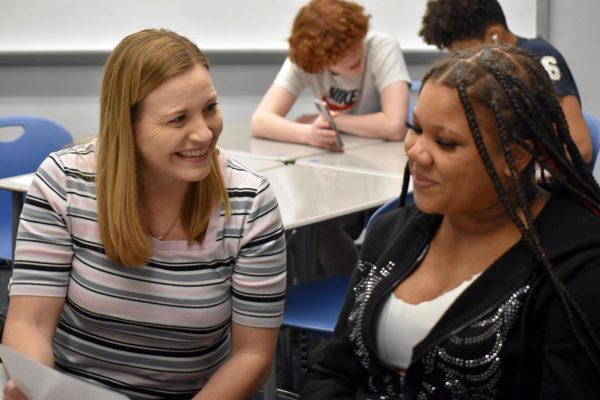Palo Alto High School community expresses outrage and takes action after alleged sexual assault incidents
Investigating recent alleged Palo Alto High School sexual assaults and the advocacy of the student-run Paly RISE task force and club
Photo courtesy of the Paly RISE officer team // Used with permission
A Zoom meeting screenshot of Paly Responsive Inclusive Safe Environment (RISE, @palyrise), a student task force committed to the goals of sexual violence education, prevention and justice, is displayed.
February 19, 2021
Recent events surrounding sexual assault allegations and solidarity for victims at Palo Alto HS
A Palo Alto High School (Paly) alumni’s ex-girlfriend posted a statement on her Snapchat story on Jan. 23 revealing an incident previously unknown to her — two years ago, there had been a rape allegation filed against him. This allegation was officially filed with the school and the police department, and according to current Paly senior and Paly Bring Change 2 Mind (BC2M) President Audrey Joachim, the victim “suffered a lot mentally and was unhappy with Paly’s handling of it.”
The alleged rapist’s ex posted about his prior allegations because he had seemingly not faced any consequences for them — he is currently enrolled at college, has continued to be a prominent figure in the community, attends parties and has had new girlfriends since the allegations.
Her initial Snapchat story served as a catalyst for outrage on social media, where many posted in solidarity for sexual assault victims after seeing her post. In addition, 14 girls in total came forward with accusations against the alleged rapist, and Joachim cites that she has also seen allegations from both girls and boys against other alleged perpetrators in the community on social media, most of which reference incidents that happened during the 2019-20 school year.
In the days that followed, the allegations and overarching issue of sexual assault continued to garner attention. Joachim says that she posted the sexual assault hotline on the BC2M’s Instagram account, which received over 1.5K shares and likes, as opposed to their typical 20-30 likes on most posts.
“It’s not necessarily people posting ‘this kid’s a rapist,’” Joachim said. “It’s also just support for people coming out, and there’s also been a lot of other people coming out with other accusations made and publicized — I think it’s just that people are getting the courage to speak up now because they feel supported.”
Joachim adds that sexual assault and harassment are prominent issues within the high schools in Palo Alto — for instance, Joachim cites a sexual assault case in 2017 that many students feel was not dealt with appropriately by the Palo Alto Unified School District (PAUSD) administration. And the problem has persisted — last school year, there were over 50 reports of sexual harassment violations in the district.
On Jan. 27, Don Austin, the PAUSD superintendent, posted a Schoology message addressing and acknowledging the situation at hand. In the message, Austin also cited that during the “2019-2020 school year, the district received 50 reports of sexual harassment in which 5 were reports of sexual assault or misconduct.”
During the 2019-20 school year, ‘20 alumnae Katherine Buecheler and Alesa Aalami, current freshman at UCLA and Barnard College respectively, co-founded Paly Responsive Inclusive Safe Environment (RISE, @palyrise), a student-run task force and club that aims to combat sexual violence in a meaningful, tangible way. When the current RISE leadership team updated them about the developing situation, they wrote a statement outlining their advice for steps moving forward, which was posted on the RISE Instagram account.
After the rape allegations and outburst on social media, both BC2M and Paly RISE scheduled meetings in the following days to address the ongoing situation. Paly RISE held a meeting on Wednesday, Jan. 27, to directly address the issue, and Joachim says BC2M had a meeting the next day, Jan. 28, to discuss “the mental health issues that can be triggered by sexual misconduct, whether it be rape, sexual assault or sexual harassment” and “how to support victims, or people that come forward, and also action to take — since not everyone’s comfortable posting on social media — within our community or on a broader scale.”
Aalami says that she and Buecheler attended the Jan. 27 RISE meeting. They offered guidance, advising the current RISE leadership team to consolidate and present data to PAUSD representatives to help them fully understand the extent of the issue.
RISE co-president Dani Colman says that during their Jan. 27 RISE meeting, there was immense support and turnout — the club originally had approximately 15 active members, but their meeting had over 100 participants, and after the meeting took place, over 90 people signed up to be members on their Remind notification service.
“While we were expecting club meeting attendance to be greater than usual, we had no idea over 100 students and faculty members were going to be there,” Colman said. “But with such a large crowd, we split attendees up into several smaller groups. And within these groups, we discussed our own experiences and considered steps we can take in order to reach our goals of justice and prevention. I think people really wanted the opportunity to speak and be heard at this meeting. So that’s exactly what we aimed to do, is give everyone the chance to talk and share their feelings after this week.”
During the Jan. 28 BC2M meeting, however, Joachim says she didn’t think focusing specifically on the recent allegations and its social media response was relevant — both out of respect for the victims and to eliminate unnecessary repetition.
“This is really pressing and I’m a victim myself of sexual [harassment],” Joachim said. “I chose not to report officially, but I just know that this can take a huge mental toll, and people need to understand how to support others and how to deal with things like this, because it is a huge — it’s a really big deal. BC2M is focused on the stigma against mental illness, so we’ll be focusing on these events under that lens, not about this boy or about the victims.”
Joachim was a victim of sexual harassment during her freshman year, but chose not to report it. The consequences of her experience continue to impact her life — she says she has PTSD and now needs a 504 plan, which provides her with double time for testing because of its impacts on her test taking. Additionally, since she has tried to block out negative memories, her memory in general has suffered.
She says she has chosen not to report the incident because “it’s just not worth it to me, which sucks because I wish that I would feel comfortable coming forward and this person shouldn’t be able to not suffer any consequences, but I feel like if I come forward, I’m going to suffer more consequences than he would.”
Joachim believes that the Paly administration has repeatedly dealt with the issue of sexual violence insufficiently, and as a bystander to girls who want the administration to take action, “it’s really heartbreaking to watch this happen.”
“I always say that if I could go back and reverse it, I wouldn’t because I just have grown so much from it,” Joachim said. “Obviously the repercussions are terrible, but I’ve done so much therapy, so much DBT [dialectical behavior therapy], which is group therapy, and I feel like I’ve really matured. It’s helped me mature a lot, and I would not wish it on anyone else, but I do feel like I made the best out of the consequences of it. It’s given me a good perspective.”
Brief history and student perspectives on the Palo Alto Unified School District (PAUSD) administration
The administration at Palo Alto High School has been inconsistent for years — according to Buecheler, there was a different principal each year she was in high school, and there have often even been instances where her peers and herself did not know who their principal was.
These administrative changes were particularly evident in 2018, when three administrators left Paly in the span of four months — former Principal Kim Diorio, former Assistant Principal Vicki Kim and former Assistant Principal Janice Chen, who is currently an MVHS Assistant Principal.
These changes in the administration made it challenging for Buecheler and Aalami to implement systemic reform, and it also posed challenges when they graduated and had to pass down the club’s leadership.
“Alesa and I especially worked close with the then District Deputy Superintendent Karen Hendricks, and she was with us a lot of the way, supporting us to make this student-run club, and she has witnessed our frustrations with the administration,” Buecheler said. “She was a very good support system for us but she actually had found another job [and resigned effective Jan. 31, 2020], and that was very hard because when we were transitioning in our RISE leadership, we really wanted to have her as a resource for our new RISE leaders.”
Similarly, RISE Community Outreach Officer and senior Tessa Ehrlich explains that she and other RISE members were working with the district’s Title IX Coordinator Megan Farrell to implement changes to their website and educate students; however, because she resigned effective Nov. 20 2020, this progress was stunted.
Despite her own frustrations about their turbulent administration, RISE co-president Dani Colman says that many community members wanted these administrative changes.
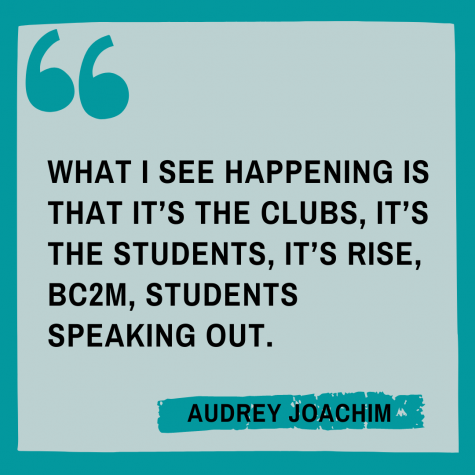
“I will say, considering the well known mishandling of similar events in prior years, I think students feel as though their reports of negative and traumatic experiences are not being taken seriously by the administration in the district,” Colman said. “So I think a lot of people actually feel that there was a need for change within the administration.”
Joachim agrees, and says that from the perspective of the student body, the volatile administration and their seemingly limited scope of action has caused students to take their own initiatives, such as RISE and BC2M.
“What I see happening is that it’s the clubs, it’s the students, it’s RISE, BC2M, students speaking out,” Joachim said. “And I don’t want to discredit the administration, but then again at least with the principal — it’s not a steady administration. But I’m on the Principal’s Advisory Committee as well, so I’ve actually been able to get to know my principal [Brent Kline] a little bit better this year. And getting to know this new principal, I actually do really like him and I think he does really care.”
Colman adds that their principal, Brent Kline, offered them support and solidarity, and mentioned that he said he was not just an administrator or a mandated reporter, but rather someone looking to implement helpful, systemic changes.
“He seems really eager to make a connection with RISE and really have a strong relationship with us, rather than just mirroring what past administrators have done, which is periodically checking up on us rather than actually establishing a relationship,” Colman said. “And he did take time out of his day to come to our meeting [on Jan. 27], which we did not formally invite him to, so he had to find out about it on his own, and actually asked for permission to come … I personally feel like we finally have someone who’s willing to work with us and listen, which is a hopeful sign.”
Paly RISE: The Founding
Paly RISE co-founders and ‘20 alumnae Katherine Buechler and Alesa Aalami were in a social justice pathway during their time in high school, which focused on project-based learning.
During her sophomore year, Buechler compiled information about their district’s education surrounding sexual assault, hoping to investigate areas for improvement. During her junior year, she and Aalami took this a step further when, as part of a school project, they were tasked with finding a social justice issue of prevalence within their school and proposing a way to address it.
Buechler and Aalami both knew they wanted to tackle the issue of sexual violence within and beyond their high school community, and as part of their project, developed an activity in which students would come to the school quad and make advocacy-related posters and art. The event was successful — over 70 people participated, and students seemed engaged and excited.
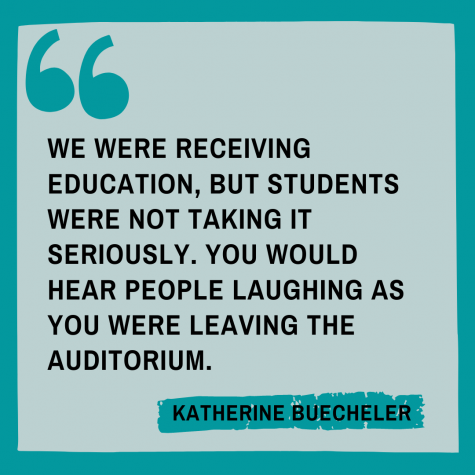
Following this, they realized that there was a “huge disconnect between PAUSD and the students and education that goes on” pertaining to sexual assault.
“We were receiving education, but students were not taking it seriously,” Buechler said. “You would hear people laughing as you were leaving the auditorium. And so it just didn’t seem like we, as a school district and a community, were taking this prevalent issue — things kept happening and incidents kept coming up — seriously enough. We wanted to find a way to connect our student body to our district, and make a connection that could give students more comprehensive education around consent.”
Aalami says that before founding RISE with Buechler, she was motivated by a series of incidents in her high school community and beyond, such as the Brock Turner rape case and Christine Blasey Ford’s testimony. In addition, she noticed that the process of reporting sexual harassment and assault to the school or district seemed inaccessible — when she looked up sexual harassment and assault on the school website, no results came up, and the same was the case for the district website. Instead, Alami only found legal jargon relating to Title IX legislation that was difficult to comprehend. Since she was in the social justice pathway, she synthesized these findings as part of a project.
Later, during her junior year, Aalami designed a survey in collaboration with the Student Wellness Center and with advice from IDEO, a design-thinking company. The survey was meant to “assess how effective our current sexual harassment and assault prevention was.”
Aalami focused on the fact that there was one schoolwide assembly related to sexual assault per year, which took place on Safe and Welcoming Schools Day, along with other activities like earthquake and fire drills. She cites that the attendance at this assembly, however, was consistently less than 50% of the student body.
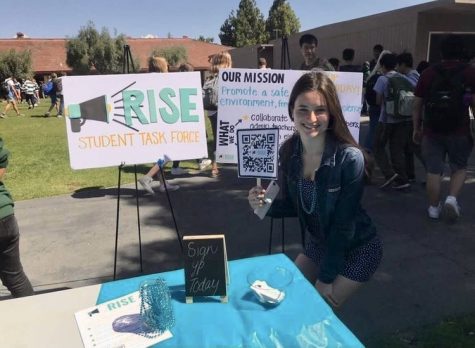
Aalami’s survey received 242 responses, and after disseminating it, she found the general consensus to be that the current education surrounding the issue was inadequate.
Buechler and Aalami then presented the data to the district, which Aalami said “sparked their revamping of our current sexual harassment and assault education.”
“When we presented at the board meeting, the feedback was very positive, but we also have to consider the history,” Aalami said. “If they were to be discouraging of RISE in our mission, then I think they would receive a lot of backlash. But we did collaborate very closely with the [now former] district Deputy Superintendent Karen Hendricks. We have a relationship with her, and we have a relationship with the former RISE parents.”
Buechler adds that “the former RISE parents” refers to the parent task force that was created by the then interim superintendent Hendricks after an incident in 2017 when the school violated Title IX, according to the U.S. Department of Education’s Office for Civil Rights (OCR). The task force’s mission was to foster a culture where sexual harassment and assault are not tolerated — they aimed to do so through education beyond the sole school assembly.
After Buechler attended one of their meetings, she found that they were eager for a student perspective, which, along with the aforementioned activities and initiatives taken by Aalami and Buechler, inspired the founding of Paly RISE.
“There obviously needed to be more accessibility to the student perspective because district members and parents — they want to hear student voices,” Buechler said. “And on the other side, students also want to say something, and they have so much to say. They just don’t know where to say it. And so Alesa and I, we worked really hard partially our junior year, and then the summer going into our senior year to come up with this club — we were super, super, super nervous. It’s always something that both of us wanted to do. But it’s kind of scary doing it when you’re younger, because you don’t know how people are going to react. But people were signing up, and it ended up working out really well.”
Paly RISE: The Goals
Buecheler explains that from the very beginning, RISE’s main objective was to “connecting the student voices to the district to create an educational system that is the most beneficial, most efficient and most comprehensive for students.”
During the first semester of RISE, Buecheler and Aalami worked closely with public speaker and founder of a series of Sexual Misconduct Prevention and Affirmative Consent Programs, Anea Bogue, who was assigned to host four 40 minute workshops that would be implemented throughout the year.
“We spent the first semester kind of looking through her proposal, putting any suggestions we had,” Buecheler said. “Her education was about consent, but it was also about healthy relationships. So an example of something that she had was, these cards that would say different scenarios, and the activity was determining whether it’s a healthy relationship or not. I think what we realized is that first, we needed more kind of classroom, smaller groups that can make students feel more comfortable and more open and more open to talk about this, kind of uncomfortable issue. We looked at those scenarios, and we [made] them even better by making them more relevant to our lives and the lives that we live as high school students. We’re having cards about certain [situations] that can go on on Snapchat, and actually bringing up those conversations. I think the scenarios they had originally were just a little cliche, and they were just hitting the surface level.”
RISE Recruitment Director and senior Libby Spier agrees, explaining that the previous scenarios were often unrealistic, such as someone asking to borrow a dress without permission, and “these parallels that just don’t even amount to the severity and to the weight that this topic has.”
“And COVID-19 really slowed us down a little bit because we were actually working with the person who does these presentations or videos, because we knew that this was a major issue,” Spier said. “We needed to provide good education on a high school level at a minimum. Because of COVID-19, that all got shut down. And we had been working from almost the beginning of the year to when school got shut down, to create these different programs that she would show but we worked on [them] with her. And yes, they weren’t perfect, but they were so much better than what we already had. So that was frustrating that we lost that and it’s not like we can pick right up where we left off.”
In addition to these lessons, Aalami says that RISE also offered opportunities for members to design their own projects that are tailored to the needs of their school, such as improving accessibility to resources on their school website and having the sexual assault hotline on the back of student ID cards.
At typical RISE meetings now, members split up into groups and collaborate on their projects. Aalami and Buecheler did not see these projects being implemented because of COVID-19 and the shift to distance learning, but members continue to work on projects like continued enforcement of Title IX and more education for both high school and middle school.
Spier adds that projects like improving accessibility to resources on their school’s website and having comprehensive education is critical, because victims or friends of victims are often unfamiliar with their rights and next steps to take after an assault. For instance, at their Jan. 27 RISE meeting, Spier remembers one of the girls speaking about her experience after getting assaulted.
“The girl in my group [said] she reported it to police because that’s what she was told to do,” Spier said. “This male police just came and took her and started asking questions. She didn’t know she could ask for a female police officer. She didn’t know that she could ask for her parents or ask for a lawyer. Not only did they not read her her rights, she had no idea what was going on, which showed how much information they’re not telling us, people aren’t informed. So part of that website page is, ‘Here are the links.’ Or ‘Here’s the steps of what you need to do.’ ‘Here are the steps if your friend wants to report something.’ ‘Here’s your rights.’ Because as minors, people don’t know their rights. That was very irritating for me to hear that in such a traumatic experience where she had to relive everything, she was asked these inappropriate questions without someone being there with her because she didn’t know … that I think, was frustrating to hear that in such sensitive cases, the police [and] the district, they weren’t taking care of the student.”
The RISE middle school education project team is planning workshops about sexual harassment education — RISE Secretary and senior Coby Shpilberg says that they’ve been invited by their local Greene Middle School to give a lesson about sexual violence.
Buecheler feels that middle school administration tries to “protect middle schoolers from this so-called inappropriate information,” which she says is a large issue because assault can and has previously started in middle school. She says that due to a lack of education, sometimes students don’t know what they’re doing is wrong and students don’t know that what is happening to them is wrong. This, in turn, often leads to students blaming themselves.
“And so then these students are going into high school, and they just think this behavior is normal,” Buecheler said. “And I think that’s why we had such a lack of reporting, because students don’t know what the reporting process looks like, and because they don’t know they’re being assaulted. They think it’s normal. They think, ‘Yeah, it’s uncomfortable. But, you know, this has been happening since middle school.’ So girls and guys too, they probably had these instances where people are doing uncomfortable things, and they think they can’t speak up about it, because it’s not talked about.”
RISE Recruitment Director and senior Leslie Aboytes adds that because of the increase in interest and membership over the last couple of weeks, there is potential for RISE to expand its influence.
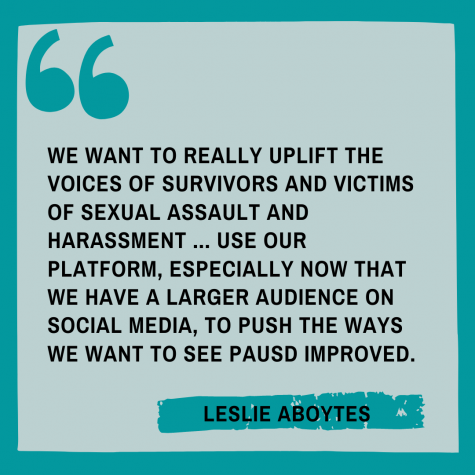
“We want to make it a space where people feel like they can come and share whatever they want to share,” Aboytes said. “We want to really uplift the voices of survivors and victims of sexual assault and harassment. I think we really want to push this forward and make RISE bigger, and maybe use our platform that we have, especially now that we have a larger audience on social media to push the ways we want to see PAUSD improved. We talked a lot about how we want the student voice to be heard, whether this is through RISE sharing or we create some sort of cohort with the district. I think there’s a lot of ways in which we can improve. The biggest thing that came out [so far] is that we’re now teaching consent in Living Skills, which is a course that we are required to take.”
Aalami adds that especially with the RISE’s recent momentum, it’s important to collaborate and work effectively with the district. Buecheler and Aalami found that in general, teachers and district representatives were receptive to their feedback.
“We found that they’re very responsive, particularly the district,” Aalami said. “We had one issue with our principal not prioritizing those Anea Bogue lessons and not implementing them. But otherwise, I would say the majority of teachers and district representatives were very supportive. While these systems may be frustrating at times, it’s bureaucratic to really take advantage of them … maybe to not completely disregard the potential for collaboration.”
“We’ve had many, many instances and periods of time when we, as students all come together, and we get upset at our district,” Buecheler said. “And, yeah, I totally agree with Alexa. The way to solve the issue is not to fight fire with fire, but to use collaboration and resources to improve the issue. But I think it’s just, it’s going to be so important for this momentum to continue and for students to keep putting in full effort and to make this the last time that this happens. I do see so many students that are so passionate, so many people showed up to that meeting. And I think it’s been really cool watching this because you’re seeing a community come together. So at the end of the day, I just hope it doesn’t lose momentum.”
This story was originally published on El Estoque on February 18, 2021.



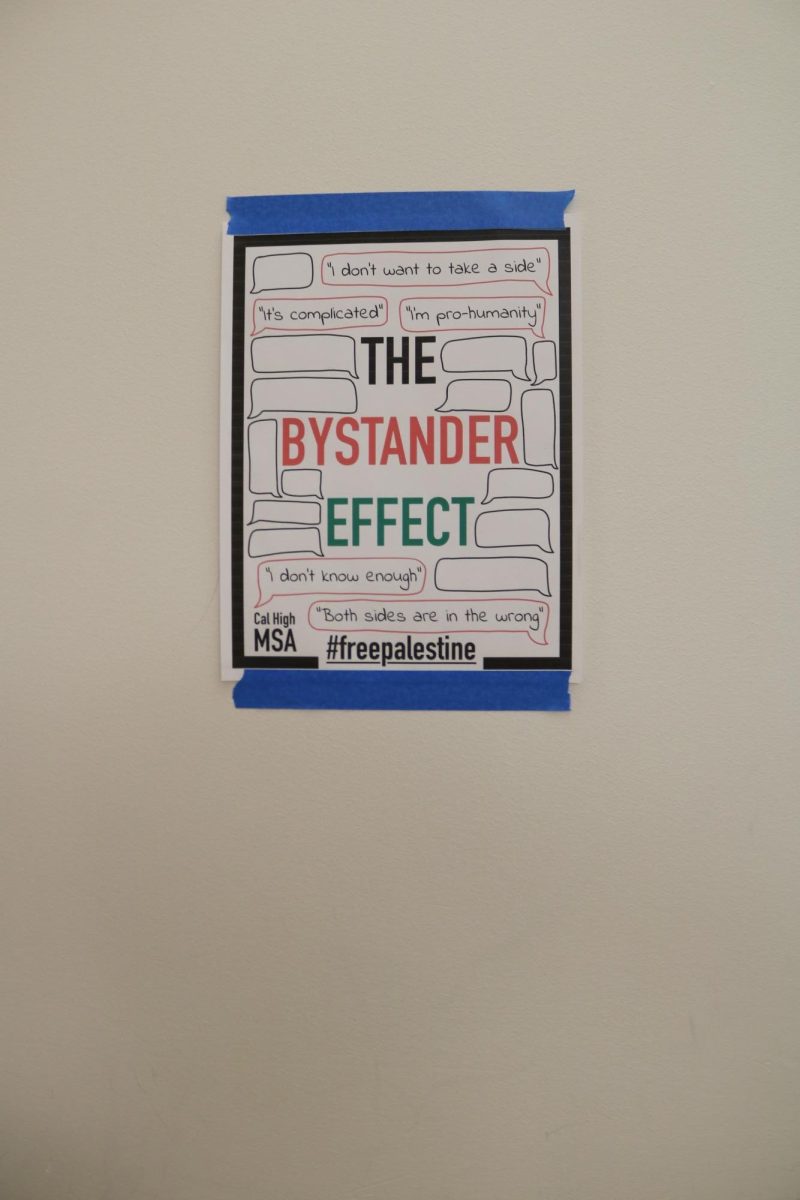
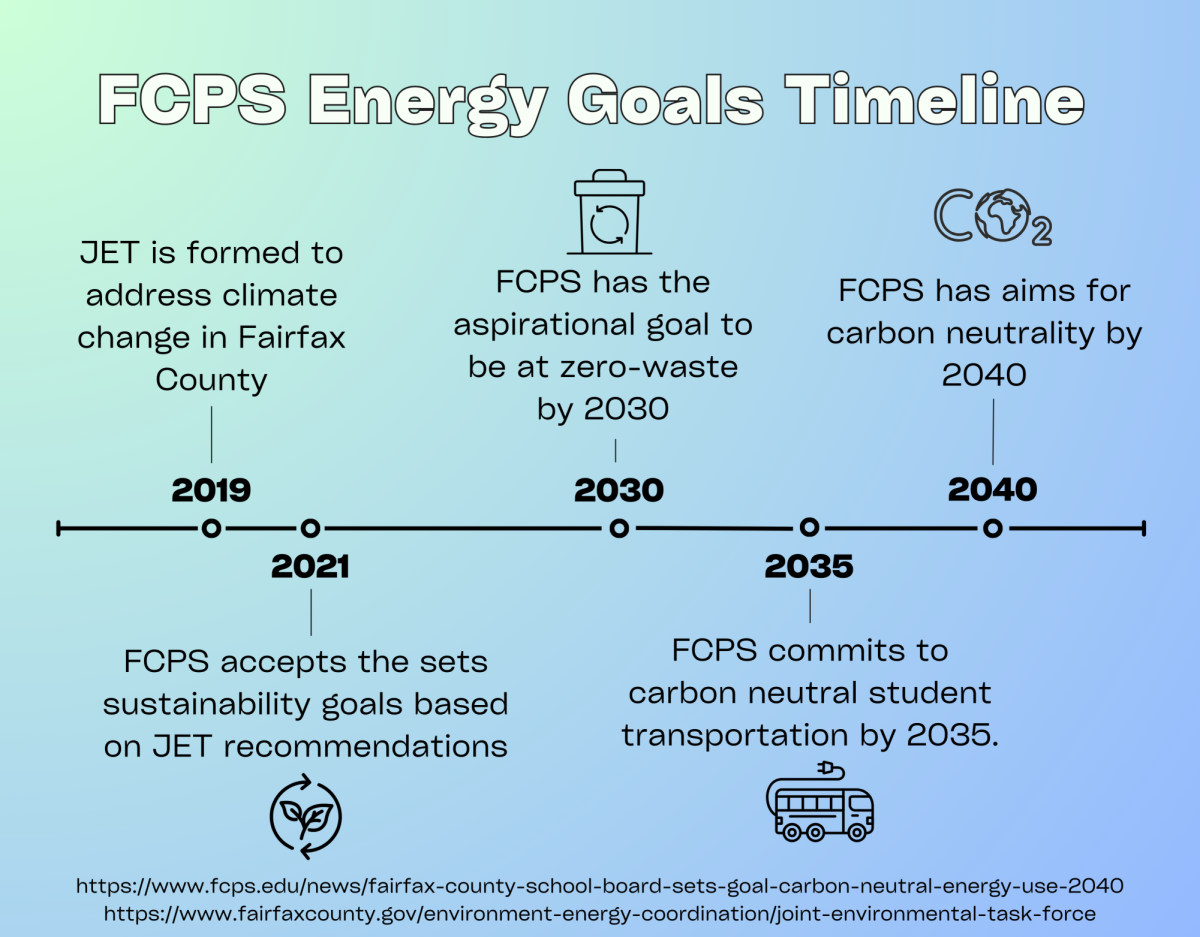




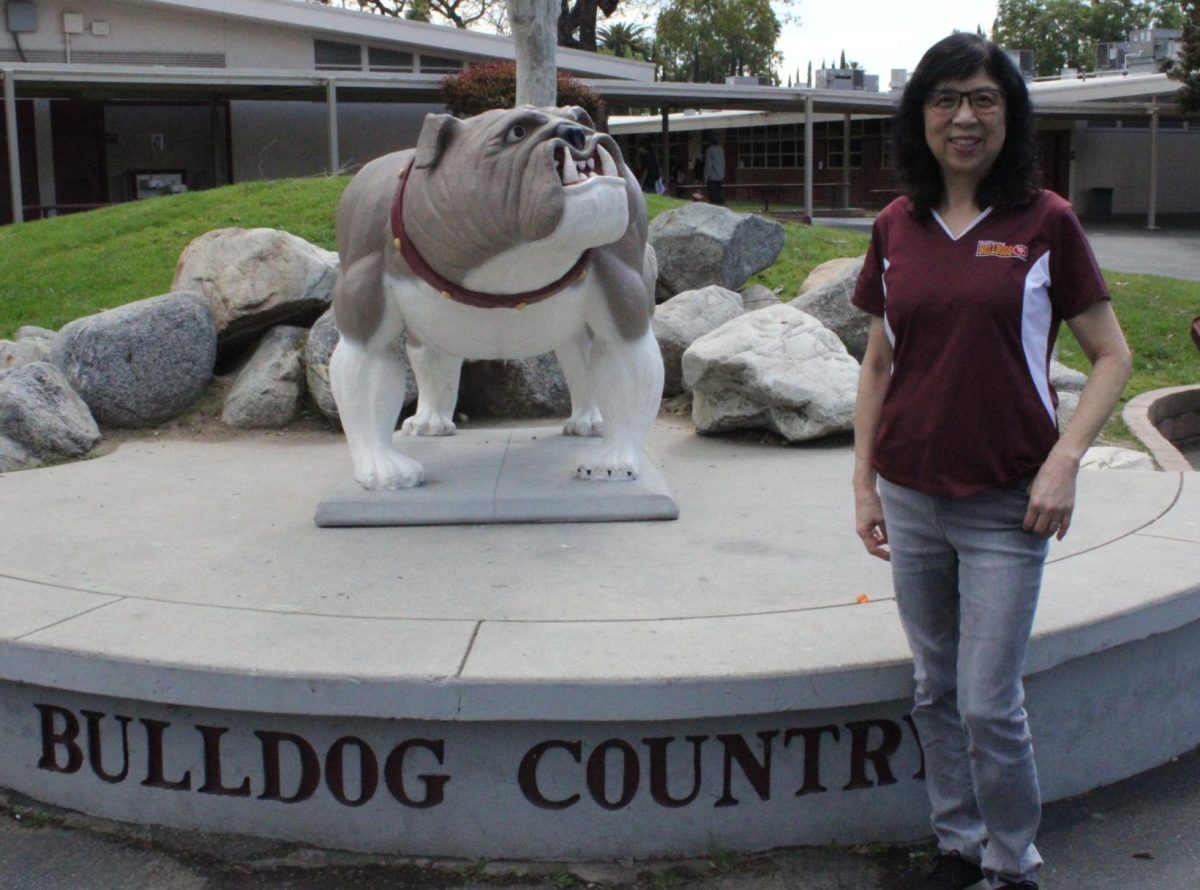


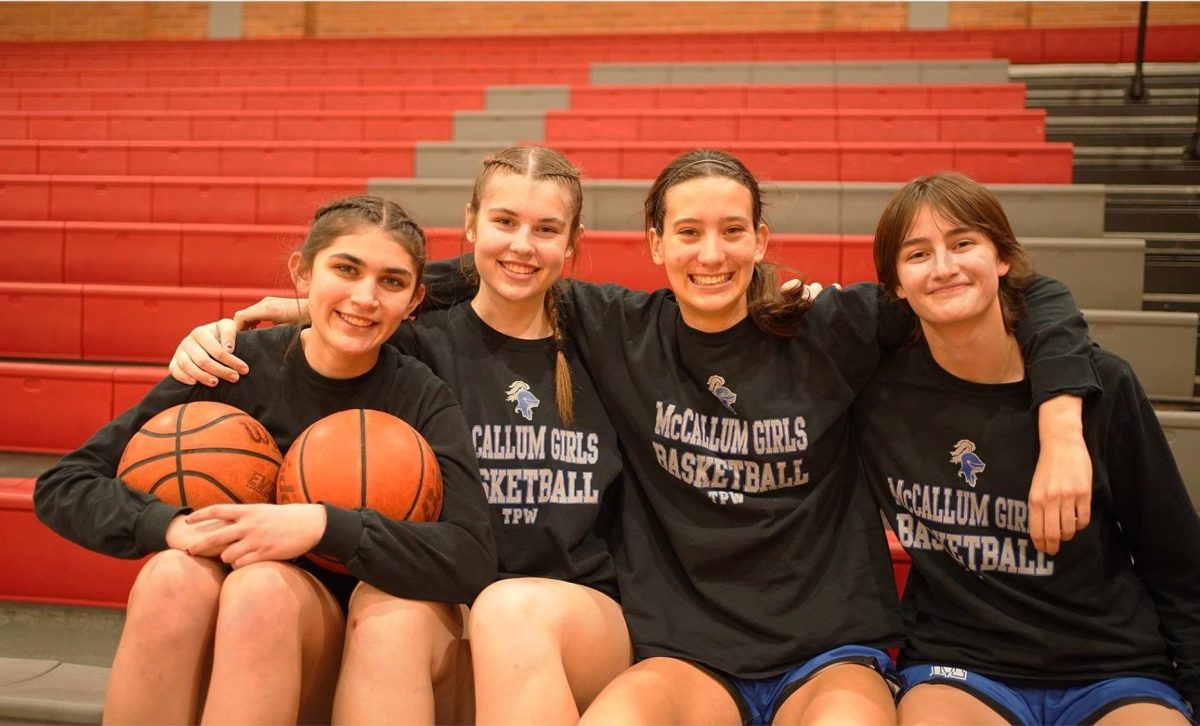
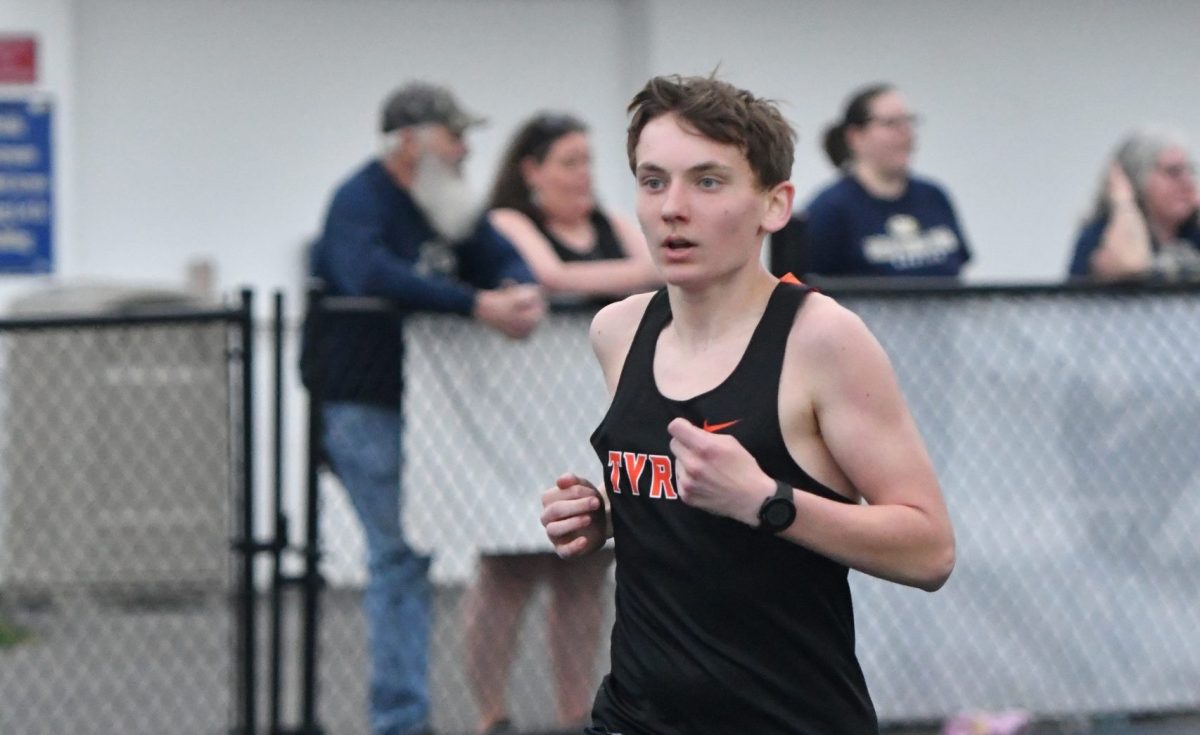

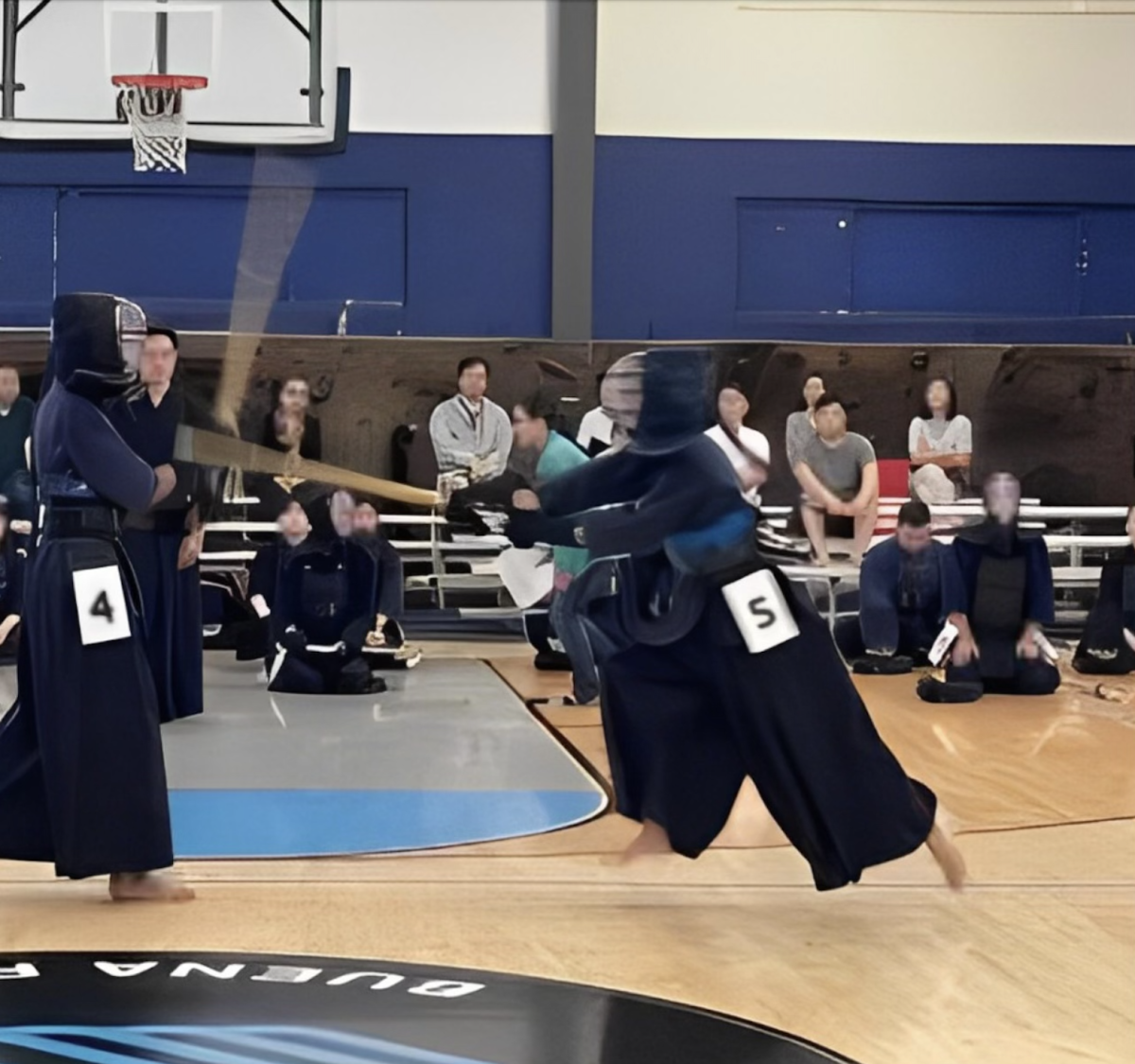
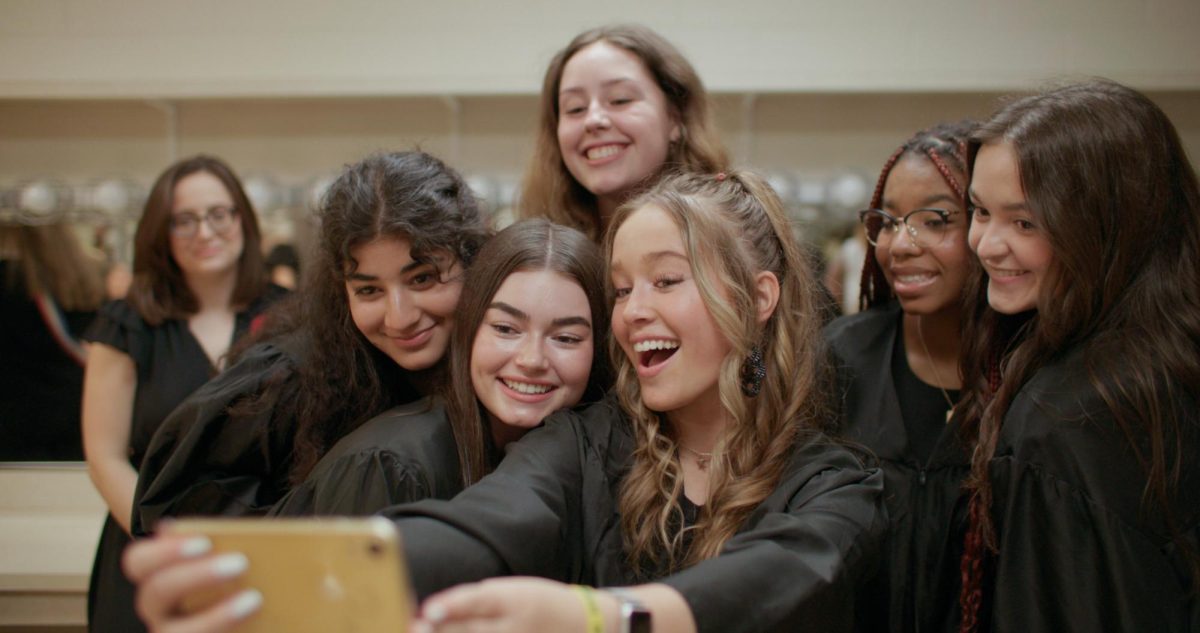
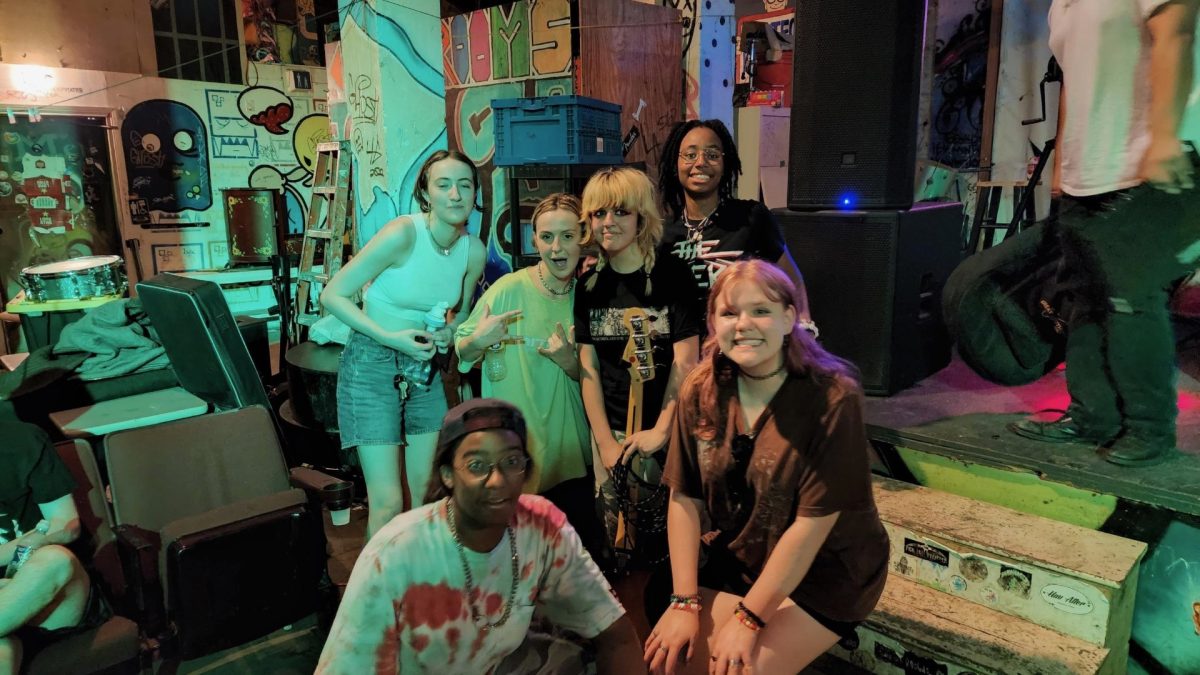














![IN THE SPOTLIGHT: Junior Zalie Mann performs “I Love to Cry at Weddings,” an ensemble piece from the fall musical Sweet Charity, to prospective students during the Fine Arts Showcase on Wednesday, Nov. 8. The showcase is a compilation of performances and demonstrations from each fine arts strand offered at McCallum. This show is put on so that prospective students can see if they are interested in joining an academy or major.
Sweet Charity originally ran the weekends of Sept. 28 and Oct. 8, but made a comeback for the Fine Arts Showcase.
“[Being at the front in the spotlight] is my favorite part of the whole dance, so I was super happy to be on stage performing and smiling at the audience,” Mann said.
Mann performed in both the musical theatre performance and dance excerpt “Ethereal,” a contemporary piece choreographed by the new dance director Terrance Carson, in the showcase. With also being a dance ambassador, Mann got to talk about what MAC dance is, her experience and answer any questions the aspiring arts majors and their parents may have.
Caption by Maya Tackett.](https://bestofsno.com/wp-content/uploads/2024/02/53321803427_47cd17fe70_o-1-1200x800.jpg)
![SPREADING THE JOY: Sophomore Chim Becker poses with sophomores Cozbi Sims and Lou Davidson while manning a table at the Hispanic Heritage treat day during lunch of Sept 28. Becker is a part of the students of color alliance, who put together the activity to raise money for their club.
“It [the stand] was really fun because McCallum has a lot of latino kids,” Becker said. “And I think it was nice that I could share the stuff that I usually just have at home with people who have never tried it before.”
Becker recognizes the importance of celebrating Hispanic heritage at Mac.
“I think its important to celebrate,” Becker said. “Because our culture is awesome and super cool, and everybody should be able to learn about other cultures of the world.”
Caption by JoJo Barnard.](https://bestofsno.com/wp-content/uploads/2024/01/53221601352_4127a81c41_o-1200x675.jpg)




